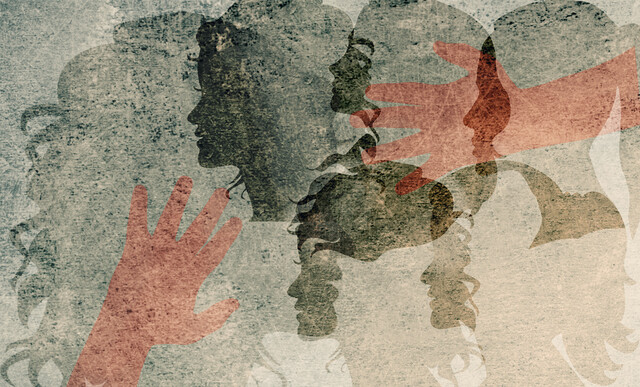Introduction
Abnormal psychology has a rather broad range and includes everything from anorexia, to schizophrenia. Some types of illnesses are neurological/physiological in nature, as is the case with schizophrenia. Others are brought about by stress, physical illness, or heredity. Because the range of abnormal psychology is so broad, this article will help you get acquainted with the definitions and descriptions of the major types of mental illness.
This article will introduce you to the major categories of mental and emotional illnesses. You will be briefly introduced to definitions, symptoms, and some causes of the most common mental and emotional illnesses.
Anxiety Disorders
Everyone experiences anxiety from time to time. Daily and infrequent life events can, and do, cause most people anxiety; however, when anxiousness becomes overwhelming and results in the loss of normal life functioning, negative physical damage, and symptoms and/or serious mental distress for extended periods of time, it has become a disorder.
Anxiety Disorder Sub-categories
- OCD (obsessive compulsive disorder)
- Phobias
- Agoraphobia
- Panic attacks
- Post traumatic stress
- GAD (generalized anxiety disorder)
Healthy or Unhealthy?
If you are wondering if anxiety can actually be "normal," the answer is a resounding yes. Some anxiety is not only normal, but a healthy response to stressful situations. We call this type of anxiety by other names, such as nervousness, tension or apprehension. We may feel a variety of symptoms, and have a broad range of reactions, to stress that falls into the "normal," or healthy, range. Some reactions may seem extreme or odd to others, but do not necessarily fit into a clinical definition of "abnormal." For instance, some people may respond to stress by exercising to the point of exhaustion; most people would find this behavior extreme. However, unless it is causing dangerous physical damage, or hurting others, it does not warrant professional help. However, if the exerciser partakes in physical activity to the point of exclusion of everything else, such as work, social interaction, school, or hobbies, to the point of continuing to exercise even after suffering serious physical injury, or to the point of compulsion (the inability to stop), then they have entered into the realm of disorder. If a response becomes a compulsion that causes the loss of life balance, it is no longer a temporary reaction or solution to a problem, but rather an illness, in itself, that requires professional intervention and assistance.
Signs of an anxiety disorder may include:
- Frequent hand washing
- Unexplained, and extreme, fear of anything
- Frequent re-occurring nightmares
- Refusal to leave the house
- Re-occurring panic attacks
Eating Disorders
Eating Disorder Sub-categories
- Anorexia nervosa
- Bulimia nervosa
- Binge-eating disorder
Healthy or Unhealthy?
America, as a nation, struggles with weight issues. The easy availability of fast, processed, and junk food has not only increased health issues, but has made a large portion of the population obese. Add to the abundance of people eating a high calorie/low nutrition diet, a large decrease in physical activity due to the popularity of TV, computer, and electronic gaming devices, and you have a double whammy of unhealthy eating and exercise habits. As a result, our population "diets" more than any other. This makes it hard to differentiate between those who have eating disorders, and those simply trying to lose weight. Furthermore, people with eating disorders, like people with drinking or drug problems, often have serious denial issues. Most are unable to acknowledge they have a serious mental illness, even when they begin to show physical symptoms of their disorder, and/or have to be hospitalized.
Signs of an eating disorder may include:
- Dieting when dieting is not necessary
- Bingeing on large amounts of food, followed by purging
- Frequent trips to the bathroom immediately after eating
- Addictive use of laxatives and/or diuretics
- Statements such as "I'm fat," "I feel fat,"
- Getting highly upset or agitated when a small amount of weight is gained
- Obviously not eating for extended periods of time, or eating very little
Mood Disorders
Mood Disorder Sub-categories:
- Clinical depression
- Bipolar disorder
- Seasonal Affective disorder (SAD)
- Postpartum depression
Healthy or Unhealthy?
Everyone experiences periods of sadness, anger, euphoria, and extra energy. However, if these feelings are constant, or frequent and long-lasting, it usually points to a mood disorder. Children and teens are often overlooked victims of depression and will show symptoms similar to those experienced by depressed adults. Additionally, bipolar disorder usually begins to display itself in puberty. To complicate things, teens often have the added vulnerability of fluctuating hormones to complicate or produce false bipolar or depression diagnoses. However, when anyone -- child, teen, or adult -- has prolonged feelings of hopelessness, worthlessness, or thoughts of suicide, these are dangerous signs of a mood disorder and should be addressed immediately, so that treatment can begin.
Signs of mood disorder may include:
- Suicidal thoughts, or attempts
- Excessive sleeping
- Lethargy
- Overwhelming sadness and despair
- Roller coaster emotions
- Hyperactive energy, followed by depressive emotional crash
- Frequent, unexplained crying episodes
- Long-term insomnia
- Winter weight gain, coupled with extreme sadness
Personality Disorders
Personality Disorder Sub-categories:
- Paranoid
- Schizoid
- Schizotypal personality
- Antisocial
- Borderline personality disorder
- Narcissistic personality disorder
- Avoidant
- Histrionic
- Dependent
Healthy or Unhealthy?
Personality changes can be healthy if they increase a person's quality of life. For instance, if someone is, by nature, shy and withdrawn and wants to be more outgoing, he or she may choose to join a group or sport that increases their confidence, thus giving them a more outgoing nature. People are capable of change for the better, and often utilize tools around them to enhance or develop traits they feel they are lacking, so that they may increase their personal happiness. Personality changes that are negative, and cause harm to self or others, are obviously not healthy. Many personality disorders are evident from birth. As with schizophrenia, many people are born with these disorders and thus, there is no obvious cause. Sometimes personality disorders can be linked to a specific event, or chain of events, and are a "side-effect" of another disorder, such as is the case with alcoholics, drug addicts, and those with eating disorders. The personality disorder is a direct result of the addiction, and ceases or diminishes once the person enters recovery from the addiction.
- Overt, repeated aggression towards others
- A constant need for attention
- Repeated antisocial behavior
- Paranoid episodes, or feelings of persecution
- Making little or no attempt to form close personal friendships outside of family
- Dressing provocatively and acting sexually inappropriate to gain attention
- Acting superior to others, and lacking appreciation for others' feelings and opinions
- Constant impulsivity to the point of self-destruction
- Self-mutilation and/or frequent suicide attempts
- A lack of empathy for others
- Extreme fear of other people (excessive shyness)
- Inability to be alone or make decisions
Schizophrenia
Schizophrenia does not have "sub-categories" in the sense that it is not a "group" of disorders. Schizophrenia is its own classification, showing its own specific symptoms. However, psychosis can appear as a "symptom" of other illnesses. For instance, periods of extreme stress can cause a psychotic episode; most people refer to this as a "nervous breakdown." These episodic periods of psychotic behavior go away on their own, without medication, once the stress diminishes or disappears. Schizophrenic symptoms can also occur with drug use, and can last several days or more. If the symptoms subside and disappear once the patient is drug free, then this is also an episodic period rather than true schizophrenia. True schizophrenia does not "go away," over time without the use of medication. Medication has had great success in treating this illness and most schizophrenics can live normal, healthy, productive lives as long as they take their medication, as prescribed. Since schizophrenia can strike anyone at any time, it is not "caused" by anything in particular, and is thought to be largely physiological and hereditary in nature.
Signs of schizophrenia may include:
- Hearing voices
- Religious mania
- Acute paranoia
- Severe mental confusion
- Distorted, nonsensical speech
- Experiencing hallucinations
- Experiencing delusions
- Feelings of unreality, or being in a waking dream
- Obsession with the occult, and thoughts of "dark forces" being at work
Sexual Disorders
Sexual Disorder Sub-categories:
- Exhibitionism
- Pedophilia
- Zoophilia
- Frotteurism
Healthy or Unhealthy?
Essentially, any sexual behavior that causes physical and/or psychological harm to another person, or one's self, is considered unhealthy, potentially dangerous, and requires professional assistance. Often, men or women who are suffering from a sexual disorder will begin showing symptoms by having fantasies or mental obsessions that are not acted on immediately. However, if these fantasies and obsessions are not addressed and dealt with, most will eventually manifest in acting out behaviors. To be diagnosable, fantasies, urges, and/or behaviors must cause extreme distress to the individual, or to others, and/or be disruptive to everyday functioning. A mental health professional can help stop dangerous, unhealthy sexual behaviors before they begin if the person is still in the "fantasy" stage of illness; alternatively, many psychologists and psychiatrists can help stop dangerous behaviors so that the patients stop hurting themselves and/or others. Often, those who have potentially harmful, and/or illegal, sexual urges and fantasies, are themselves, victims of past sexual, emotional, and/or physical abuse.
Signs of sexual disorders may include:
- Obsessive, intrusive fantasies of raping anyone, or being raped
- Any adult sexual fantasies, obsessions, or attempts that involve sex with prepubescent children
- Adult sexual obsessions, or attempts, that involve sex with minors (five or more years younger)
- Sexual acting out that is offensive and intrusive to others
- Talking sexually to, or behaving in a sexual manner with, children
- Harming anyone without their explicit prior consent during sex
- Making persistent inappropriate, unsolicited sexual comments or advances
- Sexual touching or grabbing that is unwanted
- Having fantasies about, or having sex with, animals
- Inability to become sexually aroused without an inanimate "fetish" object
Delusional Disorders
Delusional Disorder Sub-categories
- Persecutory, or paranoid
- Erotomanic
- Grandiose
- Jealous
Healthy or Unhealthy?
Those who suffer from delusional disorders rarely seem different from the general population. Their delusional beliefs may not even be evident in their everyday functioning. Only those close to them observe unusual behaviors. For instance, someone who has a delusion that the government is monitoring their actions, when the government would have absolutely no reason to do so, may refuse to use credit cards, or have a bank account, because of their belief. Remember, a delusional belief is one that could happen in a very small percentage of the population, but is not, in reality, happening to the delusional person. While the behaviors that occur as a result of a delusion may be harmful to the sufferer and others, they often go undiagnosed, and untreated, because the sufferers do not realize that their false beliefs are ungrounded. Furthermore, although loved ones may find their behavior "odd," paranoid, unusual, or "quirky," the sufferers are rarely viewed as being mentally ill, when in actuality they are.
Signs of delusional disorder may include:
- Limiting actions out of fear and paranoia
- Believing that their own failure is a result of conspiracy
- Stalking or harassing behaviors
- Believing one has ESP when they do not
- Thinking a partner is cheating, even after being proved wrong, repeatedly
- Believing someone is in love with them when they are not
Substance Abuse Disorders
Substance Abuse Disorder Sub-categories:
- Alcoholism
- Illegal drug addiction
- Prescription drug addiction
Healthy or Unhealthy?
When does drinking, taking recreational drugs, or taking prescription drugs go from occasional, experimental, or "as prescribed," to unhealthy and addictive? Addiction is defined as being when the person is no longer in control over when, or how much, of the substance they will consume. The substance is then said to control the person. Twelve-step programs offer the following description: The person is powerless over the substance, and their life has become unmanageable because of it. Many people hold down good jobs, maintain relationships, and/or attend school successfully while also engaging in substance abuse. However, if one looks more closely at the addict's life, some form of unmanageability will become evident.
Signs of Substance Abuse may include:
- Missing work, school, or appointments due to substance abuse
- Often getting drunk when deciding to only have "one or two" drinks
- Getting into legal trouble as a result of substance abuse
- Injuring self or others while under the influence of drugs or alcohol
- Becoming violent while under the influence
- Being physically or verbally abusive when under the influence
- Blacking out (not remembering what occurred while under the influence)
- Needing more of the substance over time for the desired effect to take place
Dissociative Disorders
Dissociative Disorder Sub-categories:
- Dissociative amnesia
- Dissociative fugue
- Dissociative identity disorder
Healthy or Unhealthy?
People may experience dissociation during traumatic events. A car accident, a burglary, a physical attack, or a sexual assault may all trigger a dissociative episode. However, these trauma- or stress-induced instances of dissociation do not last long, and are not considered chronic; nor do they fall into the category of "disorder." When one experiences long-term, or recurring, episodes of dissociation, professional assistance is required to help treat the causes and address the symptoms.
Signs of dissociative disorder may include:
- Forgetting large blocks of personal information
- A loss of personal identity
- Detachment from self (seeing oneself as an observer outside the body)
- Displaying distinct separate personalities with different names and attitudes
Normal Psychological Responses v. Abnormal Psychological Responses
Below you will find some typical life situations and some possible healthy reactions to them, followed by a checklist of unhealthy responses to life's normal stressors. Compare the two, so you can see the difference between how a healthy mind would respond to stress, and what constitutes behavior that is unhealthy, and a warning sign of serious mental illness.
Some examples of stressful situations and healthy reactions to them include:
A. You are feeling jittery before a job interview:
1. You take several deep breaths and avoid caffeine.
2. You take a walk before your interview.
3. You engage in some enjoyable distraction, such as calling a friend for reassurance, reading a book or magazine, or watching a TV show.
B. You are feeling uncomfortable when attending a very emotional funeral of a friend or relative:
1. You step outside for a few minutes to collect yourself.
2. You talk to someone you know at the funeral.
3. You find yourself wanting to laugh or cry uncontrollably, but suppress the urge by ducking into the bathroom for a few minutes.
C. You are having serious doubts or stress before getting married:
1. You talk to your future spouse about your worries.
2. You discuss your doubts with a close friend or family member.
3. You seek counseling with a church advisor or therapist.
D. You are excited and nervous while getting ready for a first dinner date with someone you really like:
1. You change your clothes several times.
2. You have a small snack, so you won't be starving by the time you arrive at the restaurant.
3. You call a friend to get input about what to wear.
Some examples of unhealthy reactions to stressful situations:
(The below reactions assume good physical health that is confirmed by a medical doctor. If someone you know has responses and behaviors such as those described below, they should speak to a mental health professional. All of the illnesses and disorders that cause these behaviors are treatable!)
- You often drink or take drugs to manage stressful situations.
- You begin severely restricting calories for an extended period of time.
- You take laxatives, binge on large amounts of food, and then vomit it up.
- You distort your self-image, thinking you are too fat when, in fact, you are not.
- You begin acting out with sexually dangerous or abusive behaviors.
- You begin to lie to, and manipulate, friends and family.
- You become afraid to leave the house.
- You gamble away money needed for bills, or money that is saved for another purpose, such as a vacation, car repairs, etc.
- You become violently agitated and angry when confronted by anyone who is concerned about your actions or behaviors.
- You become emotionally unattached to those around you.
- You sleep 12 or more hours a day for a week or more.
- You lose your appetite suddenly, and cannot eat for long periods.
- You develop unreasonable fears of inanimate objects.
- You develop unreasonable fears of things that are unlikely to happen.
- You become extremely short tempered over minor issues, and begin breaking things, screaming at people, and hitting others.
- You begin washing your hands compulsively.
- You berate yourself constantly and feel worthless.
- You consider taking your own life.
- You begin to believe you have serious illnesses, even though multiple doctors can find nothing wrong with you; you begin to visit your doctor very frequently.
- You cannot eat in front of others.
- You start to replay a traumatic event(s) over and over again in your mind.
- You begin having frequent nightmares.
- You begin thinking about hurting others, or yourself.
- You begin fantasizing about having abusive sex with helpless victims.
- You begin torturing animals or children.
- You become unreasonably paranoid; you hear voices in empty rooms.
- You feel threatened, and highly unsafe, for no apparent reason.
Conclusion
Many things can bring about abnormal disorders. Stress is the number one trigger. Highly stressful situations, such as divorce, death of a loved one, extreme financial hardship, being raped or sexually abused, physical abuse, having a burglary in your home or business, or witnessing or being the victim of a crime, can all trigger anxiety so debilitating and long term that it manifests itself into various disorders. Additionally, abnormal disorders can be caused by post traumatic stress (a reaction to experiencing a traumatic event in the past), a hereditary predisposition, a physical injury to the head, a chemical imbalance in the brain, or a dysfunctional or traumatic childhood. In some individuals, these disorders can appear "out of the blue," and are not connected to any particular past or present event. Schizophrenia is the most common abnormal psychosis to appear suddenly, and without warning; however, it can also be triggered by a stressful event. These instances present a challenge to scientists who are trying to find out exactly why these few individuals experience a sudden and unexpected change in behavior that does not resolve itself in a short period of time, or without medication.































